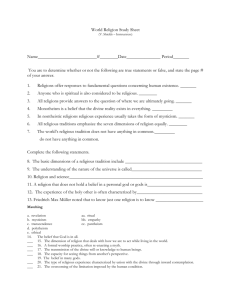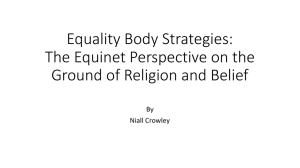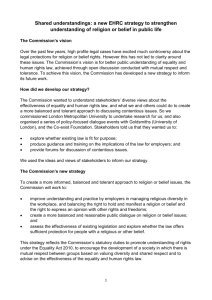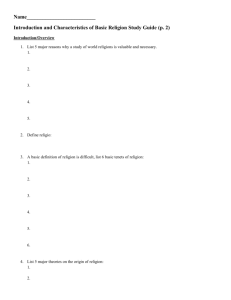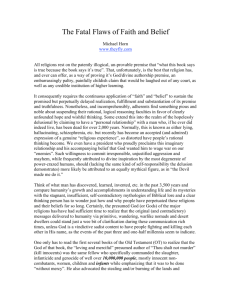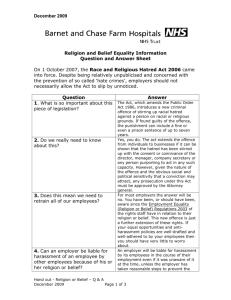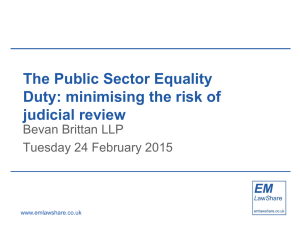Briefing 3 - Religion and Belief
advertisement
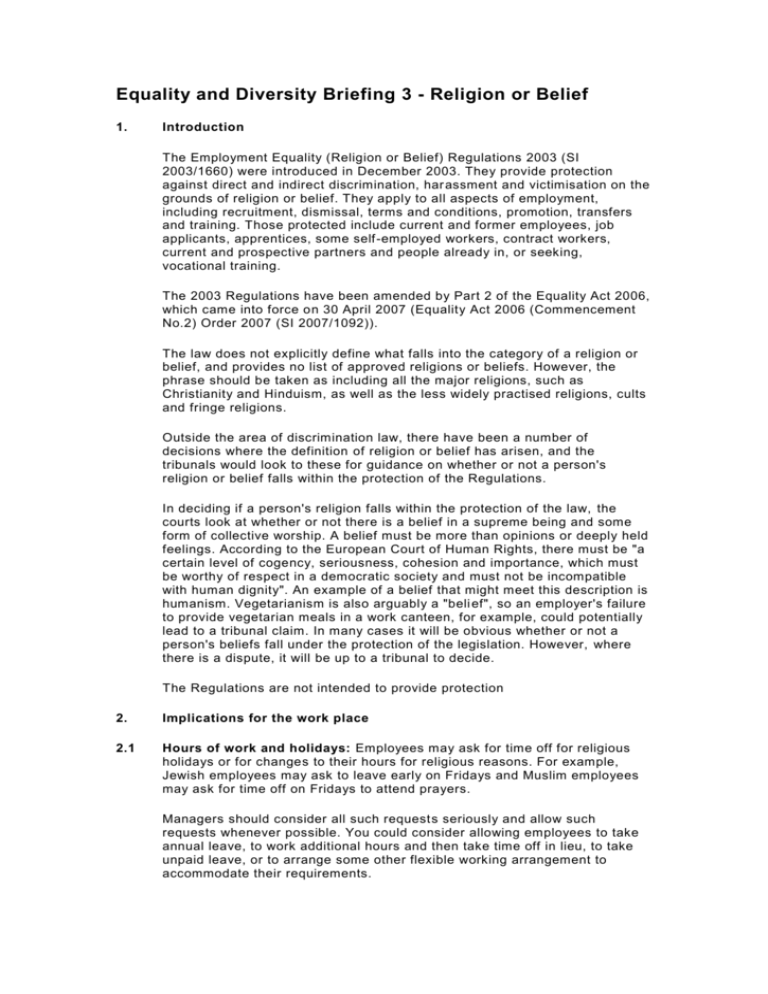
Equality and Diversity Briefing 3 - Religion or Belief 1. Introduction The Employment Equality (Religion or Belief) Regulations 2003 (SI 2003/1660) were introduced in December 2003. They provide protection against direct and indirect discrimination, har assment and victimisation on the grounds of religion or belief. They apply to all aspects of employment, including recruitment, dismissal, terms and conditions, promotion, transfers and training. Those protected include current and former employees, job applicants, apprentices, some self -employed workers, contract workers, current and prospective partners and people already in, or seeking, vocational training. The 2003 Regulations have been amended by Part 2 of the Equality Act 2006, which came into force on 30 April 2007 (Equality Act 2006 (Commencement No.2) Order 2007 (SI 2007/1092)). The law does not explicitly define what falls into the category of a religion or belief, and provides no list of approved religions or beliefs. However, the phrase should be taken as including all the major religions, such as Christianity and Hinduism, as well as the less widely practised religions, cults and fringe religions. Outside the area of discrimination law, there have been a number of decisions where the definition of religion or belief has arisen, and the tribunals would look to these for guidance on whether or not a person's religion or belief falls within the protection of the Regulations. In deciding if a person's religion falls within the protection of the law, the courts look at whether or not there is a belief in a supreme being and some form of collective worship. A belief must be more than opinions or deeply held feelings. According to the European Court of Human Rights, there must be "a certain level of cogency, seriousness, cohesion and importance, which must be worthy of respect in a democratic society and must not be incompatible with human dignity". An example of a belief that might meet this description is humanism. Vegetarianism is also arguably a "beli ef", so an employer's failure to provide vegetarian meals in a work canteen, for example, could potentially lead to a tribunal claim. In many cases it will be obvious whether or not a person's beliefs fall under the protection of the legislation. However, where there is a dispute, it will be up to a tribunal to decide. The Regulations are not intended to provide protection 2. Implications for the work place 2.1 Hours of work and holidays: Employees may ask for time off for religious holidays or for changes to their hours for religious reasons. For example, Jewish employees may ask to leave early on Fridays and Muslim employees may ask for time off on Fridays to attend prayers. Managers should consider all such request s seriously and allow such requests whenever possible. You could consider allowing employees to take annual leave, to work additional hours and then take time off in lieu, to take unpaid leave, or to arrange some other flexible working arrangement to accommodate their requirements. You would probably be justified in refusing a request for time off for a religious holiday only if it would affect the business and all employees were prevented from taking leave at that time. 2.2 Dietary requirements: Some religions impact on the diet of followers, for example Muslims are forbidden to eat pork or drink alcohol. If, as a result, an employee working with food or drink does not want to handle certain products, the employer should consider whether or not it can accommodate the employee's request without affecting the needs of the business. If an employer provides food in a staff canteen or at a social event, it should consider how best to cater for the needs of all its employees. To do this the employer will need to consult the employees about their reli gious beliefs and dietary requirements. Employers do not have to provide Halal or Kosher food if it is required by only a small percentage of their workforce, but should consider offering a vegetarian option (see above). Employers may also need to consider what provision to make for employees who need their food to be stored in a special way or to be handled separately from other food. 2.3 Uniforms and dress codes: Employers should consider whether or not their policies on clothing, jewellery and hair are d iscriminatory on grounds of religion or belief. For example, some women are required by their religion to cover their legs or head, and some men to wear certain headgear or to have long hair or a beard. Where members of staff come into contact with the public or need to wear special clothing for health and safety reasons, a dress code may be easier to justify. 2.4 Prayer facilities: Employers do not have to provide time and facilities for religious observance but should do so wherever possible. For example, if there is somewhere suitable, employees should be allowed access to a quiet place for prayer if they need to pray during the day, provided that this does not disrupt others or affect the employees' ability to do their job.

